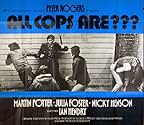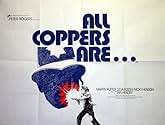A young policeman and a small-time crook are both involved with the same girl.A young policeman and a small-time crook are both involved with the same girl.A young policeman and a small-time crook are both involved with the same girl.
- Director
- Writer
- All cast & crew
- Production, box office & more at IMDbPro
Featured reviews
I really can't recommend this movie, Sat through it in an early morning bout of insomnia, Set/Made in a working class district of London in the late 60s early seventies., The plot consists of the two men vying for the affections of a an attractive young lady living in a council flat. One a rather obnoxious crim type (I suspect he's meant to be a ladies man but the rather dated attitudes make him seem a sleaze) and one a copper (married as well). I think the film was trying to say something about class relations, male/female relationship etc etc, and while the acting is adequate the stodgy plot never raises it above the mediocre. Pluses are the sixties feel and location that is like a little window to a vanished world & lots of street scenes of London at this time, I think the large power station which dominates the area where the characters live is now a modern art gallery.
Not really watchable as entertainment but fairly revealing if we're looking for insight into the varying mindsets of film makers of the time. Peter Rogers, whose company produced this, had put out Carru On Camping a couple of years before. That film had ended with a scene where a bunch of hippies were driven from a field by the film's main protagonists. In other words a victory for the sensible silent majority over the unwashed hordes threatening to corrupt society. It was part of a trend in the later Carry Ons where they became part of a kind of mainstream reactionary backlash against the 'counter culture'. In this film there is a 'protest demo' scene which continues this theme and tries to replicate the same type of battle in a more serious setting and besides being appallingly badly done it is unashamedly biased. Waving a banner about student grants , the protesters isolate a police officer and in cold blood surround him and badly beat him. Because of their grants, presumably. It makes those dreadful old political cartoons by Cummings in the Express look enlightened. Some interesting external shots though.
Famed British journeyman director Sidney Hayers is responsible for creating some truly outstanding genre cinema, including razor-edged thrillers 'Revenge', 'Assault' and Peter Wyngarde creepy occult horror classic 'Night of The Eagle', with 'All Coppers Are...' perhaps, being one of the versatile director's more neglected works. It's interesting to see Martin Potter play straight laced copper Joe, since he is better known for more outré performances in Fellini's Satyricon and Julian in the deliciously eccentric psychodrama 'Goodbye Gemini', with the always likeable Nicky Henson on familiar ground as randy small-time villain Barry, with the vivacious, breathtakingly beautiful Julia Foster being the most sympathetic character as boozy, tough-luck, beguilingly buxom bombshell Sue who genuinely falls for handsome, true-blue copper Joe, but somewhat fatefully ends up in the not so loving clutches of gregarious bad boy Barry.
'All Coppers Are...' could be seen as a rather more glum, kitchen sink version of 'Jules et Jim', with Joe, Barry and Sue's brief ménage a trois forming the catalyst for the increasingly dramatic rift between the ill-matched trio. And for the most part Hayers surprisingly gritty 70s drama remains an entertaining watch, having more artistic credibility than mere nostalgia. While the characters are only lightly sketched, the performances are dynamic, with Julia Foster eliciting some earnest pathos, and the peripheral characters are engagingly played by UK film/TV luminaries Ian Hendry, David Essex, Eddie Burn, and Glynn Edwards, even featuring a delightfully churlish cameo by bawdy British B-Movie icon Robin Askwith! My far from subjective fondness for under-represented 70s British cinema means this film is already preaching to the perverted, but it objectively exudes boodles of period charm, a slinky array of nifty outfits, fabulous shots of the city, some quality banter and a genuinely exciting, surprisingly impactful climax.
'All Coppers Are...' could be seen as a rather more glum, kitchen sink version of 'Jules et Jim', with Joe, Barry and Sue's brief ménage a trois forming the catalyst for the increasingly dramatic rift between the ill-matched trio. And for the most part Hayers surprisingly gritty 70s drama remains an entertaining watch, having more artistic credibility than mere nostalgia. While the characters are only lightly sketched, the performances are dynamic, with Julia Foster eliciting some earnest pathos, and the peripheral characters are engagingly played by UK film/TV luminaries Ian Hendry, David Essex, Eddie Burn, and Glynn Edwards, even featuring a delightfully churlish cameo by bawdy British B-Movie icon Robin Askwith! My far from subjective fondness for under-represented 70s British cinema means this film is already preaching to the perverted, but it objectively exudes boodles of period charm, a slinky array of nifty outfits, fabulous shots of the city, some quality banter and a genuinely exciting, surprisingly impactful climax.
This has the feel of the Sweeney and Up the Junction rolled into one, but doesn't really work.
The poster is a real spoiler. It depicts what is going to happen and makes it obvious the way the storyline is going to go.
Julia Foster talks and acts working class, but has a different outfit in every scene.
It's watchable, but nothing more.
The poster is a real spoiler. It depicts what is going to happen and makes it obvious the way the storyline is going to go.
Julia Foster talks and acts working class, but has a different outfit in every scene.
It's watchable, but nothing more.
All Coppers Are isn't exactly a classic - but it's definitely a product of its time. Produced by 'Carry on' Peter Rogers (with a music score from Gerald Thomas), it's another attempt by them to branch out into something grittier and more realistic - hot on the heels of the movies 'Assault' & 'Revenge' over the previous couple of years.
It has an interesting cast, and lots of good period location filming around Battersea - but in some ways this is the most interesting part of the film. It starts off brightly enough as we get to know the characters, and the story involving a young copper and a petty criminal both vying for the charms of the same girl (played by Julia Foster) sounds promising.
The problem seems to lie with the enforced 'grittiness' - it never really feels authentic, and is more like a parody of working class London at that time. It comes across as a little stilted, and doesn't have the same beating heart at its centre as similar 'kitchen sink' films from previous years (such as 'Alfie'). The story ultimately doesn't seem to reach a satisfying conclusion, send out any particular moral message, or leave any lasting impression.
Having said that, there's still plenty to enjoy if you're a fan of early 70s Brit-movies - it's lovely to see a working Battersea power station in the background of a few scenes, and the cast do their best to liven up quite a thin script.
It's very much a period piece - not the worst of its genre, but far from being the best... it's a fair cop.
It has an interesting cast, and lots of good period location filming around Battersea - but in some ways this is the most interesting part of the film. It starts off brightly enough as we get to know the characters, and the story involving a young copper and a petty criminal both vying for the charms of the same girl (played by Julia Foster) sounds promising.
The problem seems to lie with the enforced 'grittiness' - it never really feels authentic, and is more like a parody of working class London at that time. It comes across as a little stilted, and doesn't have the same beating heart at its centre as similar 'kitchen sink' films from previous years (such as 'Alfie'). The story ultimately doesn't seem to reach a satisfying conclusion, send out any particular moral message, or leave any lasting impression.
Having said that, there's still plenty to enjoy if you're a fan of early 70s Brit-movies - it's lovely to see a working Battersea power station in the background of a few scenes, and the cast do their best to liven up quite a thin script.
It's very much a period piece - not the worst of its genre, but far from being the best... it's a fair cop.
Did you know
- TriviaThe street riot scenes were all shot on the exterior Baker Street standing set at Pinewood that had been constructed the previous year for the movie La vie privée de Sherlock Holmes (1970). This street appears in other films/TV series shot at Pinewood around this time too, including The Amazing Mr. Blunden (1972), Carry on at Your Convenience (1971), Amicalement vôtre... (1971) and Alerte dans l'espace (1970). Some of the footage of the riot scenes was later re-used for the 1978 episode Look After Annie (1978) of the TV series Les professionnels (1977).
- Crazy creditsThe lettering in the opening title sequence and the closing caption "The End" was in a handwritten font, to mimic the graffiti used for the film's title "All Coppers Are [Bastards]".
- ConnectionsEdited into Les professionnels: Look After Annie (1978)
Details
- Release date
- Country of origin
- Language
- Also known as
- All Cops Are
- Filming locations
- Battersea, London, Greater London, England, UK(apartment block exteriors/various exterior street scenes)
- Production companies
- See more company credits at IMDbPro
- Runtime
- 1h 27m(87 min)
- Sound mix
- Aspect ratio
- 1.66 : 1
Contribute to this page
Suggest an edit or add missing content





























